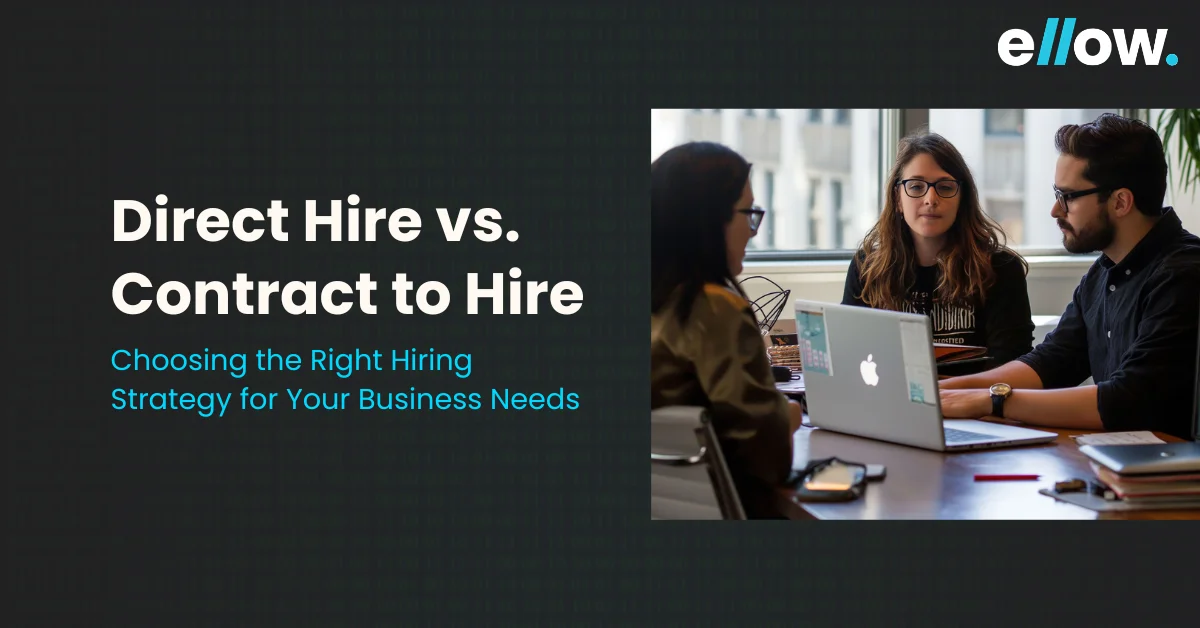Let’s build the future together.
Great ideas need great people. Partner with us to bring your vision to life, or take the first step in your career by joining our team of innovators.

As your business grows, finding the right technical talent becomes crucial to your success. When it’s time to grow your team, you face a key decision: should you opt for contract-to-hire or direct hire?
Each hiring model offers unique benefits and challenges, and selecting the right one depends on your company’s specific needs and vision.
According to the Harvey Nash/KPMG CIO Survey, the demand for tech talent is soaring to unprecedented levels. Based on this, your hiring strategy is now more crucial than ever for your company.
In this article we will delve into the key differences and similarities between contract-to-hire and direct hire, helping you navigate this crucial decision and ensure you attract the best talent for your team.
A contract-to-hire position involves hiring an employee for a short-term period with the potential for permanent employment at the end of the contract.
This approach provides a trial period for the employer and the employee to determine if they are a good fit for a long-term commitment.
During this period, the employee remains under the staffing agency’s employment but works for the client company.
In a contract-to-hire arrangement, a staffing agency takes on the responsibility of finding and screening candidates. The agency handles all the essential tasks, including sourcing potential employees, reviewing applications, and conducting initial interviews. Once the candidates are shortlisted, they are sent to the client company for final interviews and selection.
When a candidate is chosen, they start working for the client but remain on the staffing agency’s payroll. The duration of the contract can vary, lasting from a few months to an indefinite period. During this time, the client company evaluates the employee’s performance and fit within the organization.
If the client is satisfied with the employee, they can offer a full-time position. If not, the contract can simply end without any further obligations.
Direct hire involves a company offering a job directly to a candidate, usually for a permanent position. Employees hired through this method receive full company benefits and salary.
In a direct hire arrangement, also known as direct placement, a staffing agency is responsible for finding, vetting, and presenting candidates for the company’s open roles. These positions are typically full-time but can occasionally be part-time.
In a direct hire arrangement, the staffing agency manages the recruitment process, but the candidate becomes an employee of the client company and joins their payroll.
Companies often maintain a long-term relationship with their staffing partners, who diligently shortlist top candidates. This ensures that the company finds the most suitable candidates.
When considering the best recruitment strategy for your organization, it is crucial to weigh the advantages of direct hire versus contract-to-hire. Each method offers unique benefits tailored to different business needs and scenarios.
Understanding these can help you make informed decisions to optimize your hiring process, enhance workforce efficiency, and manage costs effectively.
In the following sections, we delve into the specifics of direct hire and contract-to-hire recruiting, highlighting their respective pros and offering insights to guide your strategy.
One notable advantage of contract-to-hire agreements is that they enable companies to assess an applicant’s performance and cultural fit prior to making a permanent hiring.
During this trial time, companies can observe firsthand how successfully the candidate executes work tasks and interacts with the team, which lowers the recruiting risk.
This arrangement also provides candidates with the chance to evaluate whether the organisation fits their expectations and ambitions for their careers.
This dual evaluation process ensures a mutually beneficial match, increasing the likelihood of long-term job satisfaction and success for both parties.
The interview process for contract-to-hire positions is generally shorter and less complex than for direct-hire roles. Since the initial commitment is temporary, employers can expedite the decision-making process, often bringing candidates on board more quickly.
This accelerated hiring cycle is particularly beneficial when immediate staffing needs arise or when project deadlines necessitate rapid deployment of resources.
By reducing the time to hire, companies can maintain momentum and address urgent demands without compromising on the quality of candidates.
Contract-to-hire employees remain on the staffing agency’s payroll during the assessment period, which helps control benefits costs. These employees are typically paid for the hours they work and are not eligible for your company’s benefits package until they transition to a permanent role.
This arrangement can result in significant cost savings, as you only incur full employment costs for candidates who have proven their value and fit within the organization. Additionally, it allows you to allocate resources more efficiently, focusing benefits on long-term employees.
Contract-to-hire is an excellent option for managing roles with uncertain timelines or fluctuating workloads. For instance, when launching a new project, entering a new market, or dealing with seasonal demand, contract-to-hire provides the flexibility to adjust staffing levels as needed.
This approach ensures you have the necessary skills and personnel to meet immediate demands without committing to permanent hires prematurely. If the need for the role persists, you can convert the contract employee to a full-time position, providing continuity and stability.
Similar Reads: What is Contract Staffing and its Benefits?
One of the major benefits of direct hire recruiting is its ability to foster loyalty among new employees. When an individual is hired directly into a permanent position, they often feel a strong sense of belonging and inclusion. This stability and inclusivity encourage them to invest more in their role and the company.
Over time, this sense of loyalty can lead to higher retention rates, as employees are less inclined to seek opportunities elsewhere.
Loyalty is especially vital for roles that require a long-term commitment or where frequent turnover could disrupt operations and client relationships.
By promoting a stable and committed workforce, direct hire recruiting helps ensure the ongoing success and efficiency of your business.
Direct hire recruiting can expedite the hiring process significantly. Organizations can quickly fill permanent, full-time roles with qualified candidates by working with specialized staffing firms.
Staffing firms like ellow have extensive networks and resources, allowing them to deliver candidates swiftly, sometimes within 48 hours for non-executive roles.
This rapid response capability is crucial in a dynamic market where the ability to adapt to changes and fill roles quickly can maintain or boost productivity, minimize downtime, and ensure that business operations continue smoothly.
Permanent positions often offer a higher level of job security compared to contract roles, making them more attractive to top-tier talent.
High-caliber candidates, especially those not actively seeking new opportunities (passive candidates), require significant incentives to consider a job change.
A direct hire role, with its promise of stability and inclusion in the company’s benefits program from day one, can be the deciding factor for these individuals.
Furthermore, direct-hire positions appeal to candidates looking for long-term career growth and development opportunities within the organization.
Direct hire recruiting involves paying a one-time fee to a recruiting agency, but it is more cost-effective in the long run. Direct hires are added to your payroll immediately, eliminating ongoing costs associated with keeping the candidate on the staffing agency’s payroll.
This method avoids the markups that agencies might charge for contract workers.
Although it offers less flexibility than contract-to-hire, the cost savings and stability provided by direct hires can be substantial, especially for roles that are essential to the core functions of your business.
| Aspect | Contract-to-Hire | Direct-Hire |
| Definition | Initially hired on a contract basis with the potential to become a permanent employee | Hired directly as a permanent employee from the start |
| Employment Duration | Short-term contract, typically 3-6 months | Permanent, indefinite duration |
| Hiring Process | Faster, less rigorous | More thorough and time-consuming |
| Benefits | Limited benefits during the contract period | Full benefits from the start |
| Risk for Employer | Lower risk can evaluate performance before permanent hire | Higher risk, the commitment made upfront |
| Cost for Employer | Potentially higher initial cost due to contractor rates | Lower long-term cost with a salaried employee |
| Job Security | Uncertain, depends on conversion to the permanent role | Higher, with stable long-term employment |
| Flexibility | Higher, easier-to-end contract if necessary | Lower, more difficult to terminate |
| Candidate Evaluation | On-the-job evaluation during the contract period | Evaluated through interviews and references only |
| Onboarding | Quicker, less comprehensive | More extensive onboarding and training |
Contract-to-hire staffing is an effective strategy for businesses to evaluate potential employees before making long-term commitments. This approach allows employers to assess a candidate’s skills, cultural fit, and overall performance in real-time work environments. To maximize the benefits of contract-to-hire arrangements, consider the following tips:
Creating a detailed plan from the outset is crucial for evaluating contracted talent effectively. This plan should include specific criteria and benchmarks for assessing the contractor’s performance. Think about what success looks like in the role are there key performance indicators (KPIs) or specific goals that the contractor should meet? Document these metrics.
Without defined success metrics, decisions about hiring or not hiring the contractor can become arbitrary, leading to potential confusion and frustration for both the employer and the employee. A well-structured game plan provides a roadmap for evaluating performance objectively. It also ensures that all parties understand the expectations and standards required for a permanent position.
Establishing a clear timeline for the contract period is essential for maintaining transparency and setting realistic expectations. Although the timeline might shift based on the evolving needs of the position or the business, having an initial set deadline is beneficial. Communicate this timeline to both the recruiting firm and the prospective candidate from the beginning.
A predefined timeline helps everyone involved understand the duration of the contract and what to expect in terms of decision-making milestones. This approach minimizes surprises and aligns the contractor’s goals with the company’s needs. For example, knowing there is a three-month evaluation period allows the contractor to focus on meeting performance benchmarks within that timeframe.
Enter contract-to-hire agreements with the good faith assumption that they may lead to full-time employment. This mindset is essential because one of the primary advantages of such arrangements is the extended evaluation period, which helps in finding the perfect candidate for a critical role.
From day one, treat the contract employee as if they are a direct hire. This means providing them with the same onboarding, training, and integration support that full-time employees receive. By doing so, you help them adapt more quickly to the company’s demands and culture. This approach also fosters a sense of belonging and commitment from the contractor, increasing the likelihood of a successful transition to a permanent role.
Additionally, integrating contract employees fully into your team from the start helps in evaluating their true potential and compatibility with the team. When contractors feel like they are part of the team, they are more likely to contribute effectively and demonstrate their capabilities fully.
Finding the right software developers for your team is crucial, and ellow.io makes it easy. Our platform connects you with top-tier talent from around the globe, ensuring you get the best professionals for your project.
One of our standout features is the speed of our hiring process. We know time is critical in the tech world, so our streamlined procedures help you onboard developers quickly. Plus, every candidate undergoes thorough vetting by industry experts, so you only deal with qualified professionals.
Using ellow.io is also cost-effective. Traditional recruitment can be pricey and slow, but our pre-screened talent pool saves you time and money, speeding up project start times.
Our global reach means you have access to a diverse range of skills and perspectives, whether you need full-time developers or part-time contractors. And with our dedicated support team, you’ll have help at every step.
With ellow.io, building your dream team of software developers is quick, easy, and efficient.
Recommended Read: How ellow Can Accelerate Your Hiring Process
When hiring software developers for your team, it is crucial to consider your options. Both direct hire and contract-to-hire have their advantages, but direct hiring means you must manage the entire hiring process.
While direct hiring requires managing the entire hiring process, contract-to-hire offers flexibility and a trial period to ensure the candidate is a good fit before making a long-term commitment. Using a recruiting agency or a remote staffing solution can alleviate this burden.
At ellow.io, we connect companies with pre-vetted, software developers and technical professionals. We have assisted numerous companies in scaling their technical teams quickly and affordably by matching them with candidates who often become valuable, full-time team members.
Direct hire means the employee is hired permanently by the company and receives full benefits. Contract hire involves hiring a worker for a specific period or project, often through a staffing agency, with no long-term commitment.
Direct hires typically receive full benefits, job security, and a long-term commitment from the company. This can lead to higher employee loyalty and stability within the team.
Contract hire is ideal for short-term projects, seasonal work, or when specific expertise is needed temporarily. It allows companies to be flexible and adjust their workforce according to project demands.
Direct hiring requires the company to handle the entire recruitment process, from job posting to onboarding. In contrast, contract hiring is often managed by a staffing agency, which handles recruitment, payroll, and other administrative tasks.
Yes, many companies use contract-to-hire arrangements, where the contractor may be offered a permanent position after a trial period, based on their performance and fit within the company.

GCC vs Outsourcing vs Remote Teams: What Works in 2026

Vibe Coding vs AI Assisted Coding: The Difference That Will Define the Next Generation…

From Code Generation to Bug Detection: 10 AI Tools Every Developer Should Know in…
Please feel free to share your thoughts and we can discuss it over a cup of tea.
Get a quote
GCC vs Outsourcing vs Remote Teams: What Works in 2026

Six Things to Consider When Hiring Remote Talent

ellow.io enters remote hires market with AI-based screening process